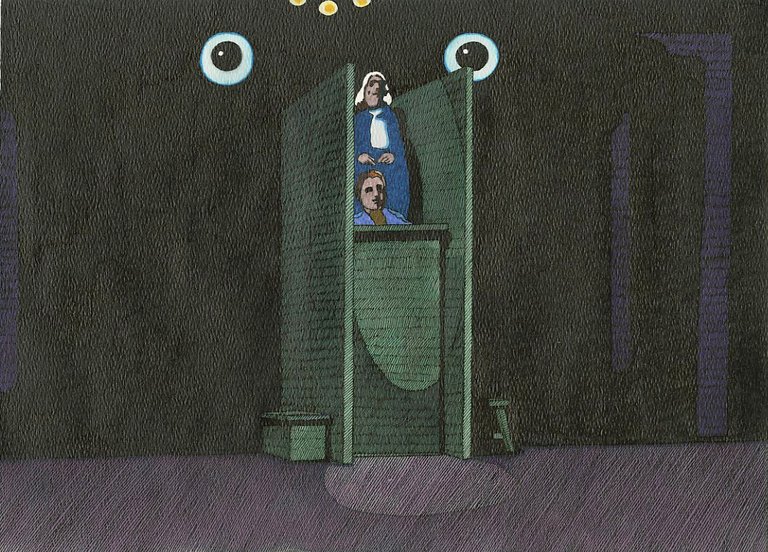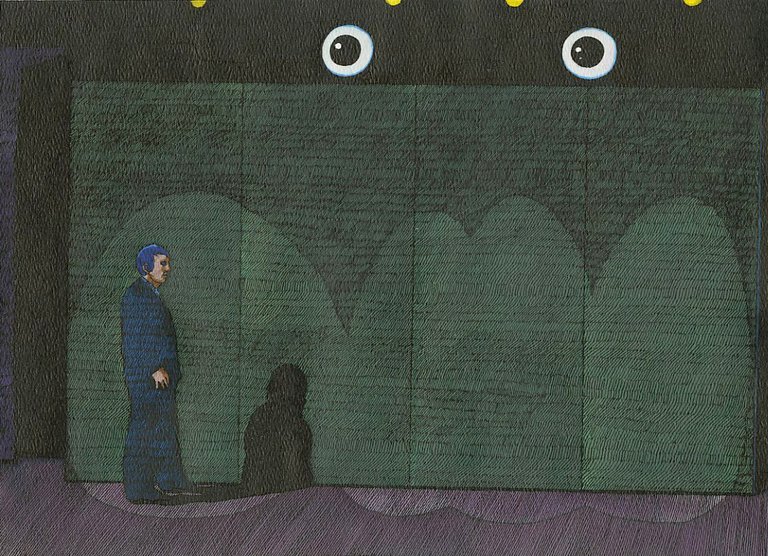
It is surprising that Kafka surprisingly doesn't surprise anyone. To fight against nonsense or to consciously accept it? Whether a person searches through life for meaning or will give up his destiny depends only on him. Franz Kafka is a magician who pulls a convicted criminal, Josef K, from a black hat. He made him a black cloak of destiny, which Josef K. would not even try to take off. The mystery of an unusual hero in the The Trial starts from his incomplete name. He lives a completely normal, absurd life, working as a bank clerk.
The world of the The Trial is just a part of the puzzle that we need to agree on. The Trial is the immutable fate of yesterday's, today's and tomorrow's men. We live in the world, but we're out of it. We've been walking long distant paths.

A prospective, ambitious and young clerk one morning, on his thirtieth birthday, is arrested by two guards.
K. was innocent, outraged and offended. As the novel develops, Josef K. is increasingly losing himself in the labyrinth of the trail that has been brought against him. The trial runs quietly and continuously. Everything had already been completed before it started. Josef K. was guilty in advance and therefore convicted. His life was determined, the days and hours were counted, and the time of death was accurately known. A life is taken away for the sake of defamation.
The trial, initiated at the request of an unknown, ends with murder for unknown reasons. The guilt rests on the fact of existence. The Invisible Court is caught up and the Accused complains in these processes without a word. Kafka is talking about lost trust in man, about God in vanity. The world is a strange landscape and life is an attempt to extinguish the unknown. In the The Trial is not only the world that is alienated , but also your own self.
In the events in the book there is nothing that is safe. Josef K. slowly enters into the soul fear and feeling of insecurity because the invisible world of laws and regulations has a power over him. Invisible bureaucracy, dusty rooms. Accused and arrested, he didn't know why he was charged and how to defend himself. The hero carries the blame in himself until he is completely penetrated, rounded and captured.

The first sentence of The Trial is paradoxical :
''Someone must have been telling lies about Josef K., he knew he had done nothing wrong but, one morning, he was arrested.'' [1]
''K.found himself, without intending it, in a mute dialogue with Franz, but
then slapped his hand down on his papers and said, "Here are my identity
documents." "And what do you want us to do about it?" replied the big
policeman, loudly. "The way you're carrying on, it's worse than a
child. What is it you want? Do you want to get this great, bloody trial
of yours over with quickly by talking about ID and arrest warrants with
us? '' [2]
What kind of a world is it where people break into houses without an arrest warrant and take away an innocent man? Instead of judging themselves and their deeds, they judge a person who is not guilty. Josef K. lives in a devious world, in a world where innocent people are guilty and guilty of innocence. It is normally abnormal and abnormally normal. The arrested man lives freely.
''Watch, William, he admits that he doesn't know the law, and at the same time claims to be innocent. "[3]
This sentence could be interpreted in many ways. This law, which governs them, seems to be unknown by anyone. And the only law no one knows is the law of God, in which God judges us all, and we are deprived of any rebellion. That's my only explanation for arresting an innocent man, taking him to the Trial and the death sentence. But again, besides all this I have to point out that Joseph K. was not a varnish.
Where is the judge whom he never saw? Where is the High Court to whom he never came? He raised his hands and spread all his fingers. " [4]
A judge whom Joseph K. never saw could be God, a high court he never came to can be a terrible judgment. Spreading fingers at that moment before death itself, before going to court and before getting to know the judge of God, can present prayer.
Avoiding meaning is the meaning of the The Trial:
"You are looking for meaning and doing the most sensible thing in the world here." [5]
The idea was to find a discovery, and Joseph K. never tried to find it. Even the fact that he at the beginning of the novel also rejects both the trial and the possibility of guilt, and finally becomes an accomplice in his own execution, can't be explained either by psychological development or by psychological breakdown.

''Before choosing or throwing a challenge to the organs of prosecution and starting with them an uncertain and dangerous game he defines the "security" and "natural flow of things". However, this is not only the wrong choice but also the biggest logical error in his thinking and judgment, because it will soon show that this "safety" path is the most insecure route he could choose, since from then on until his death he will not be safe at any moment. Likewise, it will be shown that his notion of "natural flow of things" is the biggest misconception he could fall into. And here is the Kafka's system of the philosophy of cognitive absurdity, according to which things are completely opposite from what they seem to be. " [6]
Josef K. leaves everything to the case all the time. Instead of struggling to look for a person for whom he was sentenced, he surrenders and, by himself, attributes himself to the death penalty. Abortion, laziness have killed him. Not knowing the rules, he played their game.
Paradoxically in the novel is the lack of accurate time and space. The only thing we know about the time is that it lasts for a year, from Josef's thirtieth to thirty-first birthday. But this year is actually his entire life, so we can say that the novel runs from Josef's birth to his death.
The last chapter of the novel has many symbols: it talks about untouchable legal rules and norms. The entrance is not impossible, but it can not be entered, because behind one guard is always the second, behind the second there is third and so everything is indefinable.
All these are only side issues besides the most important and complex one, and this is the question of Joseph K's guilt. This guilt is in the most intimate relationship with K's ignorance of the law and with the absence of self-criticism and the re-examination of his past. Before talking to the priest, Josef K. has a desire to bring everything into line and live the life he lived before the arrest.
Does it make sense to fight against nonsense? Josef K. lived in a futility circle from which he could not find a way out. Is it worth the search for the truth? Is it worth fighting for justice? Is it worth it to quit as a dog on a quarry and let the shame to live in our place? -No!
You have to fight. Everything needs to be meaningful. What makes life meaningless? Josef K. consciously entered into a dead-endless street.
Novel The Trial is not an answer but a question. Franz Kafka consciously raises questions, and the answer is only one: The purpose of life is searching for the truth.
This was my translation from Serbian to English from PULSE article ''Paradoks u romanu Franca Kafke ,,Proces’’ by T.Perovic
[1] The Trial, Franz Kafka page 23
[2] The Trial, Franz Kafka page 26
[3] The Trial, Franz Kafka page 27
[4] The Trial, Franz Kafka page 186
[5] The Trial, Franz Kafka page 31
[6] The Trial, Franz Kafka page 13
My name is taken from this book, "Jozef K." Richards. I feel and have felt increasingly so in my life that we are all basically like the protagonist K., trapped in a futility circle, as this author pointed out, considered guilty by society until proven innocent, as if some twisted bureaucratic form of the Catholic's concept of original sin. But we must not lie down like dogs! :)
Thanks for translating and sharing.
Nice post friends...........?
Amazing post
If you need to write an essay on a work that you haven’t even read, it’s easier to turn to guys like https://custom-essays-writings.com/.